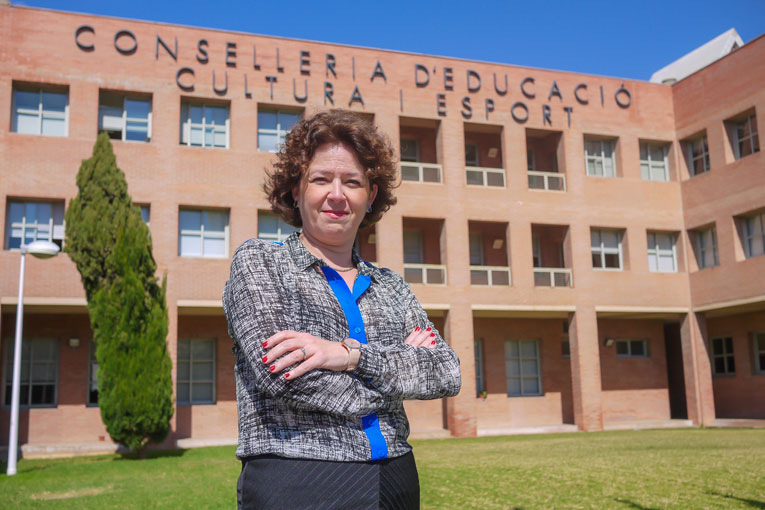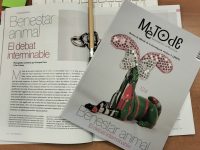Josefina Bueno: «We want science to become the engine of a new productivity model»
Managing director of University, Research and Science of the Valencian Autonomous Government


She sees herself as a «daughter of the economic emigration, of the generation that opened borders», since she was born in Paris in 1966. The general director of University, Research and Science of the Valencian regional government studied Philosophy and Arts; however, she went back to the language of her host country and now she is a tenured professor of French studies at the University of Alacant, where she was viceprincipal of the University Extension Office. «Language accumulates our ideologies, emotions and affections», Josefina Bueno remarks. In the last few years, she has researched the discourse of Muslim women in France in face of the constant challenge of establishing a conversation between Europe and the Maghreb countries. In addition, she is the academic director of the new site dedicated to African literature of the Digital Library Miguel de Cervantes. Her priorities are: increasing economic resources for public university research in order to keep and attract talent, promoting the culture of constant work and collaborative spirit, and encouraging strategies that favour gender equality in science.
Why did you cross the border between the academia and politics?
I am a professor at a public university, at the University of Alacant. I love my profession, teaching is really gratifying – fostering a critical spirit and reflection – and I research into what I believe. However, I think that it’s vital that we commit ourselves, that contribute as much as we can, because the university is going through difficult times.
Your council office is determined to boost the five Valencian public universities, contrary to the guidelines of the former Executive.
Without good public universities to encourage thinking, we cannot have a society. And there is no room for progress without the consolidation of a critical mass. In addition, the public university cannot be remote-controlled, but it has to be a compass for the interests of the citizens as a whole.
How do you face this challenge?
We want to tackle all the difficulties the Valencian university can find and help it to improve its scholarship policy – on which we have already announced our decision to support the students in public institutions – until we obtain more money to do research. We need to recover from the constant cuts in the recent years, to restore the research system and strengthen it.
Are you perhaps considering attracting talents through models such as the Basque Foundation for Science Ikerbasque or the Catalan Institution for Research and Advanced Studies (ICREA)?
We will only have proper research if we value it and we strengthen the Valencian public system. In order to do that, we have to be able to compensate scientists in accordance with their quality. Yes, we would like to start a Valencian institution similar to the initiatives of other autonomous communities that have demonstrated their effectiveness to attract and keep talent. Because we have to be able to keep decent wages for our most excellent projects.
What are the first steps you are taking to increase research funding?
The Valencian university system is the fourth largest one in Spain and, however, it is surprising that not all the horizons to get more financial support for our research have been explored yet. For example, from my general management we are working on the first COFUND request to the European Union. This is precisely a way of co-funding that provides additional financial support for the mobility programmes for regional and state research, and for multi-year programmes to look for and train researcher. We also work to get more funding from the ERDF, for example, to increase both predoctoral and postdoctoral fellowships.

In what percentage do you expect to increase the available budget for research?
We are not trying to use smoke and mirrors or give any false hopes here. Rather on the contrary. We have a goal: to instil the culture of constant work into society. Nevertheless, we believe that we can increase by around 40% the budget for research between the actual and the next term of office. Because we hope to achieve new ways of funding, like the COFUND alternative, but also to increase the contributions of internal financing from the Valencian regional government.
At the same time, you have announced your commitment to promote gender equality in the scientific career.
Women are excluded from excellence research. There is not equality and we want to change this trend. As we climb the ladder of responsibilities in the academic field we only find a rate of 21% female professors. In Spain, we only have one female vice-chancellor, at the University of Granada. For example, in our Prometheus program for excellent research groups, just 16% of our main researchers are women. And one of the main reasons is the dependent family members, both children and elders in need of care. It has been confirmed that most drastic stops in women’s research careers occur in a specific age bracket. Meanwhile, the professional career of the scientific man usually continues independently from his personal life.
Do you have any anticipated measures?
We want to treat as a priority those research groups that are balanced, with parity of representation or those led by women, and at the same time foster research with a cross-sectional gender component. We are trying to implement actions aimed at balancing those studies that are excessively masculinised – and feminised too – in scholarship policy. Thus, with equal merits, the under-represented gender in the specific grade will be the recipient of the aid. There are two reasons for this: social justice and providing models for young generations. We have also seen that we can find more women in predoctoral fellowships than in postdoctoral ones, and we are totally convinced that this fact is not exactly connected to the achievements, but it has more to do with their personal lives, since it has more influence in women’s career than in men’s. Following our gender consciousness, this must be fought.
You are establishing new bases for Valencian science.
Two decades of the same ideology, no matter what it is, set a political agenda. The Partido Popular in the region of Valencia was contempt regarding the scientific community and disregarded knowledge. In this way, we can afford to export the best quality talent, because we must no forget that the young people who leave are a cheap source of labour. The difference is irreconciliable. As a result, yes, in the ministry we have the constant feeling of rebuilding, indeed.
In what way?
In every way: building new social values, a new productive model, ideas to grow in equality, enhancing the collaborative spirit… The Valencian right wing opted for an short term economic model, with construction industry and tourism. We look at the long term. We want to reward the value of the effort, in order to make science the engine of a new productivity model. Research is an added value, not an expense without repercussion.
Should this collaboration between Valencian science and the regional production network be improved?
Research and Industry are in contact, and society is receiving a feedback. It is true, though, that this transfer must be strengthened and expanded, and also all the agents involved should be brought together. For this very reason, the Valencian Government approved the creation of the Valencian Council of Innovation and promotes the Valencian Agency of Innovation. A solid technological transfer must be achieved, the generated research must allow the company to grow, to innovate, to be more productive and, let’s not forget, to pay its workers better.
Maria Josep Picó. Environmental reporter and science communicator (Valencia).
© Mètode 2016.





